
Economist at OECD Trento Centre, working on spatial productivity and other topics in regional economics.
Last update: 3 January 2026.
- Economist: OECD Trento Centre ('20-present)
- Lecturer: Newcastle University ('16-'21)
- Post-doc: OxCARRE, University of Oxford ('13-'16)
- PhD Economics: University of Luxembourg ('09-'13)
- MSc Financial Economics: Maastricht University ('07-'08)
- BSc Economics: Maastricht University ('04-'07)
- wnv _A_T_ wnvermeulen . com
- @wnverm
- @wnverm@sciences.social
 The book looks at the role of states (US, UK, NL, FR) and international organisations (UN, EU) in their attempts to prevent the genocide in Darfur (2003-2005); from early warning to limited action in the field of humanitarian assistance, mediation, sanctions and peace-keeping.
The book looks at the role of states (US, UK, NL, FR) and international organisations (UN, EU) in their attempts to prevent the genocide in Darfur (2003-2005); from early warning to limited action in the field of humanitarian assistance, mediation, sanctions and peace-keeping.  PhD Dissertation in Economics, Awarded by University of Luxembourg, March 2013
PhD Dissertation in Economics, Awarded by University of Luxembourg, March 2013 This paper looks at whether immigration can mitigate the Dutch disease effects associated with booms in natural resource sectors. We first derive predicted changes in the size of the non-tradable sector from a small general-equilibrium model à la Obstfeld-RogofFf, supplemented by a resource income and a varying labor supply. Using data for Canadian provinces, we test for the existence of a mitigating effect of immigration in terms of an increase in the size of the non-tradable sector triggered by the positive resource shock in booming regions. We find evidence of such an effect for the aggregate inflow of migrants. Disentangling those flows by type of migrants, we find that the mitigation effect is due mostly to interprovincial migration and temporary international migration. There is no evidence of such an effect for permanent international immigration. Nevertheless, interprovincial migration also results in a spreading effect of Dutch disease from booming to non-booming provinces.
This paper looks at whether immigration can mitigate the Dutch disease effects associated with booms in natural resource sectors. We first derive predicted changes in the size of the non-tradable sector from a small general-equilibrium model à la Obstfeld-RogofFf, supplemented by a resource income and a varying labor supply. Using data for Canadian provinces, we test for the existence of a mitigating effect of immigration in terms of an increase in the size of the non-tradable sector triggered by the positive resource shock in booming regions. We find evidence of such an effect for the aggregate inflow of migrants. Disentangling those flows by type of migrants, we find that the mitigation effect is due mostly to interprovincial migration and temporary international migration. There is no evidence of such an effect for permanent international immigration. Nevertheless, interprovincial migration also results in a spreading effect of Dutch disease from booming to non-booming provinces.
 This paper presents an analysis of the Euro-zone financial markets based on a joint assessment of bonds, stocks and stock-bond correlations between groups of Euro-zone countries. The dynamic correlations visualise the divergence of integration in Europe and highlight the heterogeneity in these markets. Panel regressions using this setup on dynamic correlations offer new insights on the role of macro-economic determinants of financial markets between assets and regions. We find that when we allow for regional division, not only cross-asset correlations within regions behave differently from each other, but also cross-assets cross-regions dynamic correlations can be explained with macro-economic factors such as the relative market uncertainty between countries, balance of payments dynamics and other key macroeconomic indicators. The robust role of economic fundamentals in European financial market correlations points to the need for European economic integration based on sound macro-economic fundamentals for both current and future Euro-zone members.
This paper presents an analysis of the Euro-zone financial markets based on a joint assessment of bonds, stocks and stock-bond correlations between groups of Euro-zone countries. The dynamic correlations visualise the divergence of integration in Europe and highlight the heterogeneity in these markets. Panel regressions using this setup on dynamic correlations offer new insights on the role of macro-economic determinants of financial markets between assets and regions. We find that when we allow for regional division, not only cross-asset correlations within regions behave differently from each other, but also cross-assets cross-regions dynamic correlations can be explained with macro-economic factors such as the relative market uncertainty between countries, balance of payments dynamics and other key macroeconomic indicators. The robust role of economic fundamentals in European financial market correlations points to the need for European economic integration based on sound macro-economic fundamentals for both current and future Euro-zone members. This paper tests the theoretically founded hypothesis that the surge of SWF establishments is determined by three main factors: 1) the existence of natural resources profits, 2) the government structure and 3) the ability to invest usefully in the domestic economy. We test this hypothesis on a sample of 20 countries that established an SWF in the period 1998-2008 by comparing them to the roughly 100 countries that did not set up a fund in the same period. We find evidence for all three factors. The results suggest that SWFs tend to be established in countries that run an autocratic regime and have difficulties finding suitable opportunities for domestic investments. We do not find the net foreign asset position of a country to be similarly related to the explanatory variables, indicating that the establishment of an SWF is distinct from a national accounting result. We argue that our results indicate that it is relevant to study how an SWF interacts with the domestic economy and government policy.
This paper tests the theoretically founded hypothesis that the surge of SWF establishments is determined by three main factors: 1) the existence of natural resources profits, 2) the government structure and 3) the ability to invest usefully in the domestic economy. We test this hypothesis on a sample of 20 countries that established an SWF in the period 1998-2008 by comparing them to the roughly 100 countries that did not set up a fund in the same period. We find evidence for all three factors. The results suggest that SWFs tend to be established in countries that run an autocratic regime and have difficulties finding suitable opportunities for domestic investments. We do not find the net foreign asset position of a country to be similarly related to the explanatory variables, indicating that the establishment of an SWF is distinct from a national accounting result. We argue that our results indicate that it is relevant to study how an SWF interacts with the domestic economy and government policy.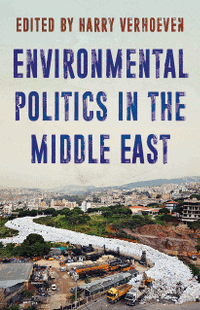 This study tests for the MENA region the effect of energy subsidies on export diversification in terms of exported varieties and number of destinations. Reform of fuel subsidies is a major issue for public finance and with regards to global climate change policy, while some MENA countries are among the highest subsidisers in the world. At the same time trade performance can be seen as a representation of general domestic economic development. Estimates suggest that subsidy reduction could be an effective tool to improve private sector performance through export diversification. Those MENA countries that have lower subsidies tend to export relatively more to advanced economies and more product varieties. These results are robust to controlling for unobserved country group characteristics, time trend, resource exports and income level.
This study tests for the MENA region the effect of energy subsidies on export diversification in terms of exported varieties and number of destinations. Reform of fuel subsidies is a major issue for public finance and with regards to global climate change policy, while some MENA countries are among the highest subsidisers in the world. At the same time trade performance can be seen as a representation of general domestic economic development. Estimates suggest that subsidy reduction could be an effective tool to improve private sector performance through export diversification. Those MENA countries that have lower subsidies tend to export relatively more to advanced economies and more product varieties. These results are robust to controlling for unobserved country group characteristics, time trend, resource exports and income level.
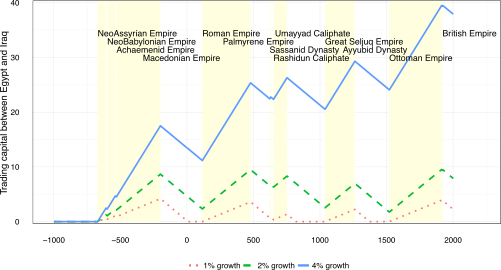 Throughout history empires facilitated trade within their territories by building and securing trade and migration routes, and by imposing common norms, languages, religions, and legal systems, all of which led to the accumulation of imperial capital. In this paper, we collect novel data on the rise and fall of empires over the last 5,000 years, construct a measure of accumulated imperial capital between countries, and estimate its relationship with trade patterns today. Our measure of imperial capital has a positive and significant effect on trade beyond potential historical legacies such as sharing a language, a religion, a legal system, or links via natural trade and invasion routes. This suggests a persistent and previously unexplored influence of long-gone empires on current trade.
Throughout history empires facilitated trade within their territories by building and securing trade and migration routes, and by imposing common norms, languages, religions, and legal systems, all of which led to the accumulation of imperial capital. In this paper, we collect novel data on the rise and fall of empires over the last 5,000 years, construct a measure of accumulated imperial capital between countries, and estimate its relationship with trade patterns today. Our measure of imperial capital has a positive and significant effect on trade beyond potential historical legacies such as sharing a language, a religion, a legal system, or links via natural trade and invasion routes. This suggests a persistent and previously unexplored influence of long-gone empires on current trade.
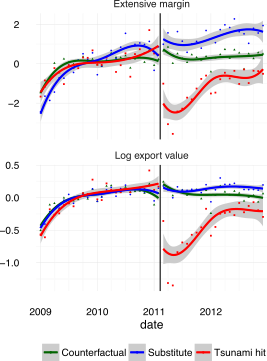 We study the effect of natural disasters on port level exports. We model the interaction between firms and ports to study how strongly exports from one port are affected by changes in the cost of exporting at neighboring ports. We extend the standard trade model with heterogeneous firms to a multiple port structure where exporting is subject to port specific local transportation costs, port specific fixed export costs and international bilateral trade costs. We show that gravity distortion due to firm heterogeneity is conditional on the comparative advantage at the port level and resulting substitution of exports across ports. We present evidence of the substitution effect using the 2011 Great East Japan Earthquake, indicating that at least 40% of exports was substituted to other ports following the disaster. The substitution effects is strongest in technology intensive product categories, which suggests an interaction between supply chains and domestic trade costs.
We study the effect of natural disasters on port level exports. We model the interaction between firms and ports to study how strongly exports from one port are affected by changes in the cost of exporting at neighboring ports. We extend the standard trade model with heterogeneous firms to a multiple port structure where exporting is subject to port specific local transportation costs, port specific fixed export costs and international bilateral trade costs. We show that gravity distortion due to firm heterogeneity is conditional on the comparative advantage at the port level and resulting substitution of exports across ports. We present evidence of the substitution effect using the 2011 Great East Japan Earthquake, indicating that at least 40% of exports was substituted to other ports following the disaster. The substitution effects is strongest in technology intensive product categories, which suggests an interaction between supply chains and domestic trade costs.
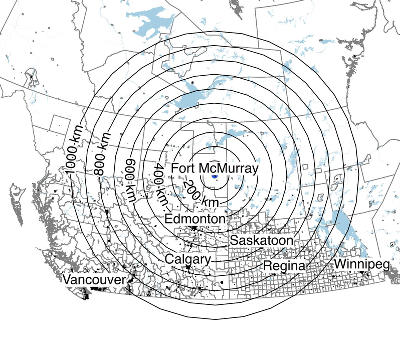 This study investigates the effects of an oil boom on manufacturing plants performance. First, we derive several predictions using a model of heterogeneous firms. Second, we test these predictions on a plant level dataset using the Canadian Annual Survey of Manufacturers for 2000–2010. We exploit the time variation of the booming natural resource sector revenue in an oil-producing area in combination with the location of manufacturing plants to create an exogenous treatment variable. The outcome variables include plant level wages, employment, sales, and exports. We find that initial plant level productivity provides an important differentiation in average plants effects. Plants that are more productive become more likely to export in response to the oil boom, while less productive plants become less likely to export. Exporting firms become more likely to increase wages relative to non-exporting firms, but less likely to increase employment. While there is a great variety in the effect by sector, we do not observe that industry linkages with the resource industry drive plant performance.
This study investigates the effects of an oil boom on manufacturing plants performance. First, we derive several predictions using a model of heterogeneous firms. Second, we test these predictions on a plant level dataset using the Canadian Annual Survey of Manufacturers for 2000–2010. We exploit the time variation of the booming natural resource sector revenue in an oil-producing area in combination with the location of manufacturing plants to create an exogenous treatment variable. The outcome variables include plant level wages, employment, sales, and exports. We find that initial plant level productivity provides an important differentiation in average plants effects. Plants that are more productive become more likely to export in response to the oil boom, while less productive plants become less likely to export. Exporting firms become more likely to increase wages relative to non-exporting firms, but less likely to increase employment. While there is a great variety in the effect by sector, we do not observe that industry linkages with the resource industry drive plant performance.
 Border effects on firms' performance are typically estimated following reduced barriers to trade, for instance due to new trade agreements. This paper estimates a border effect on increasing barriers for firms located outside of a new external EU border following the 2004 and 2007 EU enlargement. In a repeated cross-section of three flows of EBRD-World Bank survey data, the study encompasses 23 border regions in 10 countries, four of which bordered new EU/Schengen countries. Taking border transformations as exogenous changes to firms' environments, and focusing on small and medium-sized enterprises near borders, the results indicate that five years after enlargement, firms in non-EU member states near a new external EU border experienced a fall in sales of 40% and exports of 70% relative to firms near borders that did not change. Firms on the EU side of the same border experienced no such negative effect. Ten years after enlargement, the negative effects effectively disappeared.
Border effects on firms' performance are typically estimated following reduced barriers to trade, for instance due to new trade agreements. This paper estimates a border effect on increasing barriers for firms located outside of a new external EU border following the 2004 and 2007 EU enlargement. In a repeated cross-section of three flows of EBRD-World Bank survey data, the study encompasses 23 border regions in 10 countries, four of which bordered new EU/Schengen countries. Taking border transformations as exogenous changes to firms' environments, and focusing on small and medium-sized enterprises near borders, the results indicate that five years after enlargement, firms in non-EU member states near a new external EU border experienced a fall in sales of 40% and exports of 70% relative to firms near borders that did not change. Firms on the EU side of the same border experienced no such negative effect. Ten years after enlargement, the negative effects effectively disappeared.
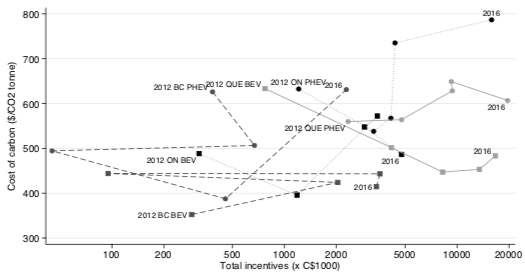 This study aims to find the effects of financial point of sales incentives on the sales of electric vehicles across the Canadian provinces from September 2012 to December 2016. Our findings indicate that purchase incentives cause the sales of new electric vehicles to increase by 8.5% on average due to a C$1000 increase in incentives. We find that 47% of electric vehicle sales across the rebating provinces (Ontario, Quebec, and British Columbia) are attributed to the purchase incentives. Results of the counter-factual simulations imply that the cost of eliminating one tonne of carbon emissions across the provinces that offer incentives over the years of our study is, on average, C$480/tonne CO2.
This study aims to find the effects of financial point of sales incentives on the sales of electric vehicles across the Canadian provinces from September 2012 to December 2016. Our findings indicate that purchase incentives cause the sales of new electric vehicles to increase by 8.5% on average due to a C$1000 increase in incentives. We find that 47% of electric vehicle sales across the rebating provinces (Ontario, Quebec, and British Columbia) are attributed to the purchase incentives. Results of the counter-factual simulations imply that the cost of eliminating one tonne of carbon emissions across the provinces that offer incentives over the years of our study is, on average, C$480/tonne CO2.